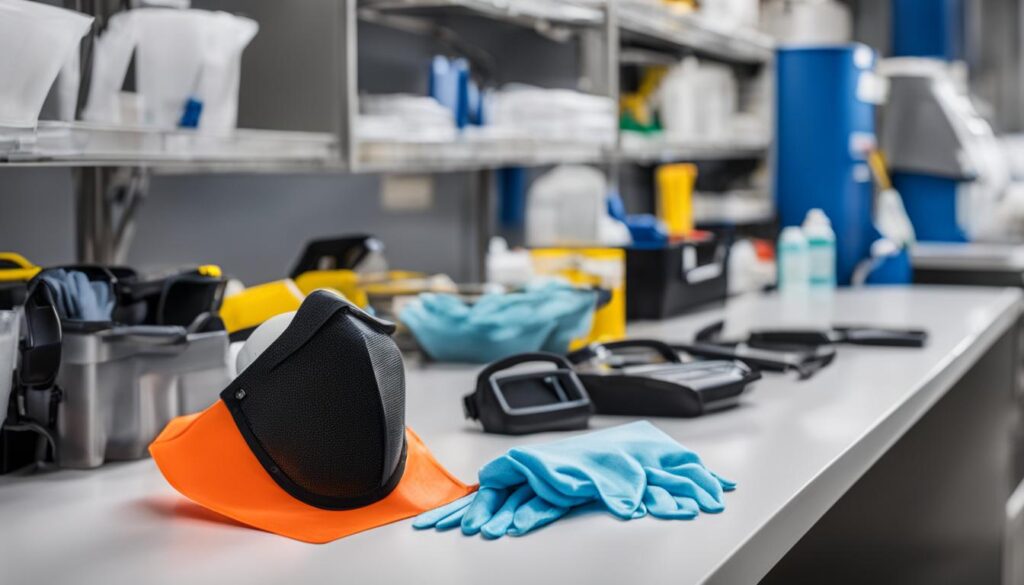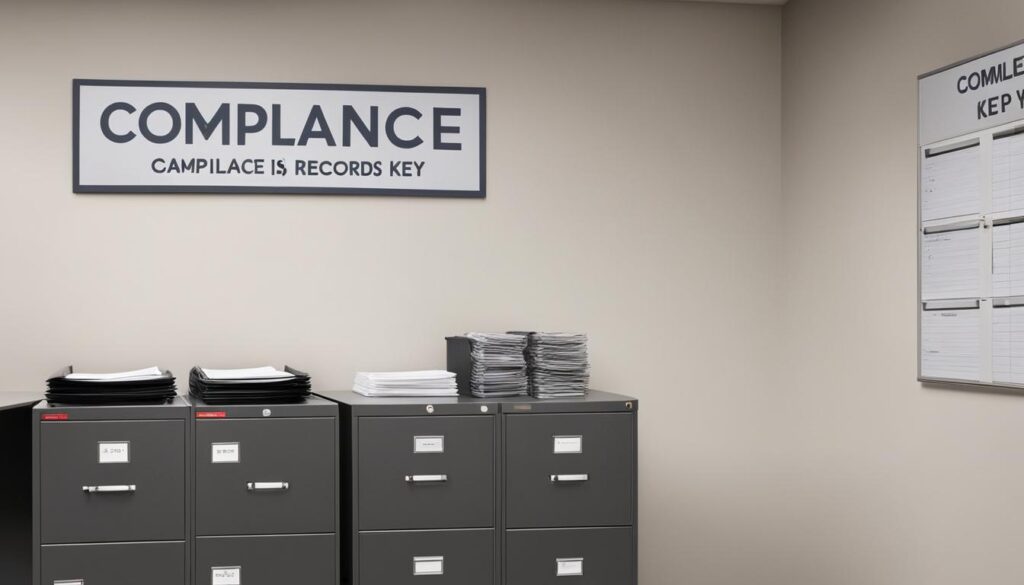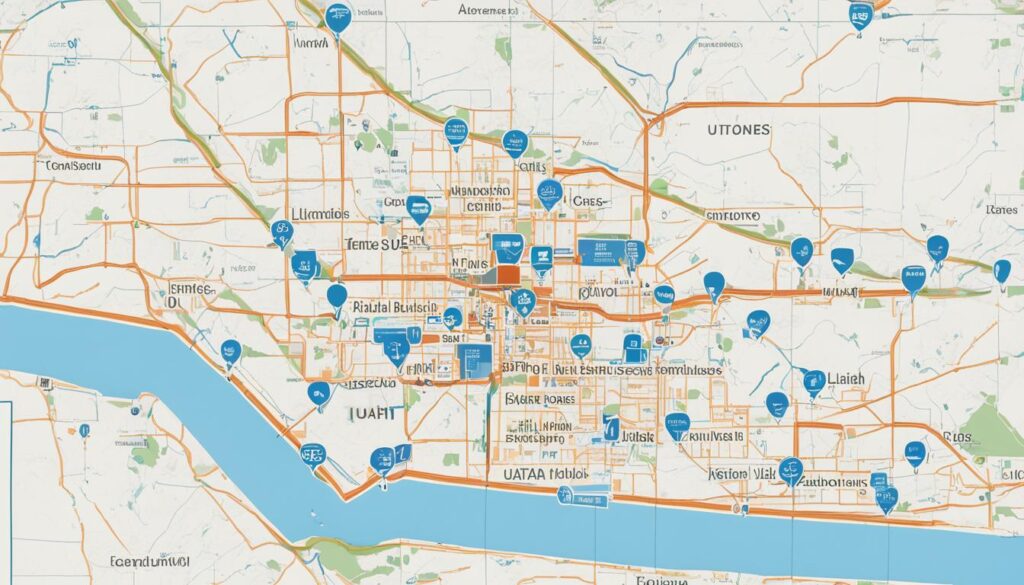Embarking on the journey of starting a cleaning business can be an exhilarating leap into entrepreneurship. You’re likely bursting with questions, especially regarding cleaning business regulations and the legal requirements associated. One question that might be at the forefront of your mind is, “Can I start a cleaning business without a license?” It’s essential to understand that while some states like Texas do not mandate a general business license, diving into the local ordinances is key.
Navigating through these initial stages can be complex, but your dedication to learning about the cleaning business legal requirements is a testament to your commitment to laying a solid foundation for your new venture.
Key Takeaways
- Understanding your legal obligations is crucial when starting a cleaning business.
- Though Texas state does not require a general business license, local permits may still be necessary.
- Compliance with cleaning business regulations may vary by city and county.
- Research is key in determining if you can operate without a cleaning business license in your specific area.
- Staying informed about licensing can prevent potential legal issues and fines.
- Establishing your business legally is an investment in its future success and reputation.
The Legal Landscape of a Cleaning Business in Texas
Embarking on your entrepreneurial journey with a cleaning business in the Lone Star State involves a nuanced understanding of the legalities of starting a cleaning service. You might be wondering about the cleaning business license requirements or the need for a cleaning business permit. While Texas prides itself on being business-friendly, it is crucial for you to navigate these waters carefully to ensure your venture stands on solid legal ground.
At the state level, Texas does not mandate a general business license. However, this doesn’t mean you can overlook the legalities of starting a cleaning business. Most cities and counties have their specific expectations and requirements, so it’s vital to conduct due diligence by reaching out to your local government offices regarding business licenses and permits for cleaning services.
Moreover, obtaining an Employer Identification Number (EIN) from the IRS is strongly advised. This step is more than just a formality; it separates your personal and business finances, offering protection and simplifying tax reporting. The EIN becomes even more essential if you plan on hiring employees for your cleaning company.
When it comes to protecting your personal assets, choosing the right business structure cannot be overstated. An LLC (Limited Liability Company) or a corporation can offer a shield against personal liability, which is vital in an industry where the risk of on-site accidents or damages is not negligible. This legal fortification can give you peace of mind as you grow your business.
- Check with your city and county for specific cleaning business permit requirements.
- Apply for an EIN through the IRS to set a solid foundation for your business’s financial health.
- Consider forming an LLC or corporation to limit personal liability and enhance your business’s credibility.
- Visit Texas’s “Wide Open For Business” website for more guidance on state-specific licensing guidelines.
Remember, while the idea of bureaucratic paperwork may seem daunting, compliance with local laws and regulations is the best investment you can make for the longevity and success of your cleaning business. Ensuring you’ve covered all legal bases will not only protect you but will also instill confidence in your clients that they are dealing with a professional and legally-sound service provider.
Assessing the Need for a License in the Cleaning Industry
When you’re considering how to start a cleaning business, it’s crucial to understand that while Texas might not have a statewide license requirement, local regulations can vary significantly. Before you dive headfirst into the business, taking the time to navigate through the complexities of licensing can save you from potential legal headaches down the line.
Understanding State vs. Local Requirements
Each city and county in Texas might have its own set of rules and regulations you’ll need to follow. Since you’re interested in starting a cleaning business without a license, you should first stop and check whether the areas you plan to operate in have specific demands or restrictions.
- Consult with local government offices regarding business permits.
- Research whether different regions have particular criteria.
- Understand the penalties for operating without the required permissions.
Gathering this information is a foundational step in ensuring your cleaning business is set up properly from the start.
The Role of Business Permits Beyond Licensing
Permits and licenses serve as more than just a formality; they ensure that your business operations align with local regulations, including zoning laws and health codes, which can vary even within the state of Texas. Consequently, obtaining the right license for a cleaning business doesn’t just legitimize your company—it also protects it.
- Identify if a local business permit is needed based on your service area.
- Learn about the zoning restrictions relevant to your business location.
- Adhere to health and safety standards to prevent future liability issues.
Ignoring these permits could put your new venture at risk for fines, or even closure, undermining all of the hard work you’ve put into starting your own cleaning business.
Choosing the Correct Business Entity for Your Venture
As you delve into the world of entrepreneurship, a significant decision awaits you in the realm of cleaning business regulations. Selecting the right business entity is not just about legalities; it’s about laying a strong foundation for your cleaning business. Let’s navigate the crucial steps you’ll need to take when determining the optimal structure for your venture.
Your choice in business entity selection will affect everything from your legal liability to how your income is taxed, and how you can raise capital. In the cleaning industry, where interactions with clients’ properties are frequent and risk exposure is significant, safeguarding your personal assets is paramount.
- Corporations might be the route you choose if you’re looking for strong personal liability protection, potential tax benefits, and ease of transferring ownership. However, they require more in-depth record-keeping, operations processes, and could result in double taxation of income.
- Limited Liability Companies (LLCs), on the other hand, provide similar protections to corporations but offer more flexibility in management and pass-through taxation to avoid the burden of corporate tax rates.
- The Sole Proprietorship is the simplest and most straightforward entity type to set up and operate, but beware, it offers you no personal liability protection—an important consideration for those in the cleaning service industry.
- Partnerships are ideal if you’re starting a cleaning business with one or more partners and are interested in a simple structure with pass-through taxation; yet just like sole proprietorships, they don’t shield your personal assets from business liabilities.
When it comes to regulating your cleaning empire, don’t overlook the significance of business entity selection. It’s not simply about tackling the here-and-now but also about setting up your business for future prosperity and protection. Always consult with a legal professional to understand the full gamut of your responsibilities and protective measures before making your choice. This step is an investment in your business’s resilience, compliance, and long-term success.
“Can I Start a Cleaning Business Without a License?” – Unpacking the Truth
If you’re pondering the idea of starting a cleaning business, you might wonder about the necessity of obtaining a license. In Texas, while you’re not required to have a general state business license, local regulations could mandate licensure for your cleaning operation. Whether you are providing services in Houston, Austin, or a small town in the vast Lone Star State, you’ll need to investigate and adhere to specific cleaning business legal requirements to ensure you operate within the law.
Legalities That Impact Unlicensed Operations
Operating without a cleaning business license where one is required by local ordinances can put your business future in jeopardy. Non-compliance with the rules could lead to hefty fines or even the shuttering of your business. To navigate the legal landscape safely:
- Check with your city and county government offices to understand their specific licensing requirements.
- Acquire an Employer Identification Number (EIN) from the IRS to legitimize your business for tax purposes and more.
- Stay informed about any changes in regulations that could affect your cleaning business.
The Risks and Consequences of Skipping Licensure
Failing to meet all legal requirements, including obtaining a cleaning business license when needed, could tarnish your company’s reputation. But, the repercussions of unlicensed cleaning business operations go beyond a damaged reputation:
- You risk incurring fines and penalties which can chip away at your profits.
- Without proper licensure, you may find it challenging to gain client trust and secure contracts.
- Being unlicensed can also limit your access to business insurance and potentially increase personal liability.
Remember, even if your Texas-based cleaning business does not need a state license, fulfilling local requirements is essential. This due diligence will protect your investment, keep your operations legal, and contribute to the sustainable growth of your cleaning business.
Insurance: An Essential Ingredient for Cleaning Business Success
As you dive into the world of entrepreneurship with your cleaning venture, it’s vital to cover all bases, ensuring that risks are managed effectively—this is where business insurance steps in. Insurance isn’t just a precaution; it’s a fundamental component of your business plan that secures the future of your enterprise against unforeseen incidents.
Cleaning business insurance requirements can vary based on the size and scope of your operation, but a few key policies are indispensable. Thinking ahead about insurance for your cleaning venture can not only safeguard your business but also provide peace of mind for both you and your clients.
- General Liability Insurance – Protects against claims of property damage or bodily injury caused by your services.
- Property Insurance – Covers damages to your own business property, whether it’s an office or equipment.
- Commercial Vehicle Insurance – If your business owns vehicles, this is essential for covering any accidents while on the road.
- Bonding Insurance – While not always required, this can build trust with clients by protecting against employee theft.
Don’t consider cutting corners when it comes to insurance for your cleaning venture. A well-structured insurance plan ensures that both legal requirements and practical necessities are addressed. Remember, a claim without proper coverage could not only be detrimental to your finances but also to your business’s reputation.
To navigate the complexities of cleaning business insurance requirements, partnering with an experienced insurance agent who understands the unique risks associated with cleaning services is a strategic move. They can assist you in selecting the right type of coverage that matches your business’s specific needs.
Ultimately, investing in the right business insurance policies is not just about protection—it’s about setting your cleaning business up for long-term success. With the right insurance in place, you’re not just cleaning homes or offices; you’re building a resilient and trustworthy brand.
Health and Safety Regulations for Cleaning Service Providers
As you dive into the cleaning industry, it’s vital to prioritize the health and safety of both your staff and clients. Complying with the Occupational Safety and Health Administration (OSHA) standards is not just a legal requirement, but it also reflects your commitment to a professional and responsible business practice. Let’s break down what you need to know to maintain a clean record with health and safety regulations.

OSHA Standards and Your Cleaning Business
Understanding and adhering to OSHA regulations can seem daunting, but these guidelines are in place to ensure a safe and healthy work environment. Here’s what you should focus on:
- Chemical Safety: Get to know the Hazard Communication standard, which requires you to properly label hazardous chemicals and provide Safety Data Sheets to your employees.
- Personal Protective Equipment (PPE): Equip your staff with the necessary PPE such as gloves, goggles, and masks to protect them against chemicals and other potential hazards.
- Training: Offer comprehensive training sessions that cover topics like handling equipment, dealing with spills, and first aid procedures in case of an incident.
- Recordkeeping: Maintain accurate records of workplace injuries and illnesses as per OSHA’s stringent documentation requirements.
State-Specific Health and Safety Programs in Texas
While OSHA provides federal guidance, Texas goes a step further with programs tailored to its own regulatory environment:
- The Occupational Safety and Health Consultation (OSHCON) program is available to Texas businesses and offers free consultation on workplace safety without fear of penalties or citations.
- Take advantage of the Texas Department of Insurance which provides resources on workers’ compensation, ergonomic workplace practices, and safety publications specific to the Texan market.
- For cleaning services dealing with biohazard cleanup, Texas has specific regulations that outline additional licensing requirements and worker safety protocols.
A cleaning service’s compliance with health and safety regulations drives not only a safe and ethical business model but also instills confidence in your clients that they are dealing with a top-notch professional service. Remember, safety is not a buzzword in this industry—it’s the foundation of your business reputation and the well-being of all involved.
Advertising Your Cleaning Services Ethically and Effectively
When it comes to advertising your cleaning services, it’s crucial not only to catch the eye of potential clients but also to foster trust and credibility from the get-go. Ethical marketing for cleaning businesses underpins not just the success of your campaigns but also sets the tone for lasting customer relationships. Let’s explore some foundational elements of promotional strategies for cleaning services that are as effective as they are responsible.
Crafting Honest Advertising Messages
You know the value of your services, and your advertising should reflect this without exaggeration or false promises. Ethical marketing begins with accuracy; from the scope of your services to pricing, transparency is paramount. Ensure that your adverts, whether online or in print, give a clear and truthful representation of what clients can expect. When you promise high standards, deliver them; this builds a brand reputation that stands on integrity.
Understanding the Promotional Do’s and Don’ts
Gaining new clients often involves offering incentives, but how you communicate these specials can make or break your ethical stance. If you’re issuing coupons or announcing a discount, be clear about the terms. Never hide conditions in the fine print. Instead, celebrate your offers proudly and openly. This clarity not only respects your potential clients but also safeguards your business against misunderstandings that can lead to frustration and loss of trust.
- Do highlight the unique benefits of your services.
- Don’t exaggerate outcomes or provide misleading comparisons.
- Do use authentic testimonials from satisfied clients.
- Don’t fabricate reviews or manipulate client experiences.
- Do make your promotional materials visually attractive and professional.
- Don’t infringe on copyrights or use stock images that don’t reflect your actual service.
By adhering to these principles, your cleaning business will not only stand out for its excellent service but will also build a reputation for honesty and ethical practices. After all, genuine and mindful marketing is the cornerstone of a business that cleans up in more ways than one.
Implementing Clear Policy Statements and Contracts
When launching your cleaning business, it’s essential to establish firm foundations with your clients. One of the best ways to achieve this is by developing comprehensive policy statements for your cleaning business. These documents not only clarify your operational procedures but also reassure clients about what to expect from your services.
Defining Service Boundaries with Customers
Your policy statements should serve as a roadmap for customer interactions and service delivery. They cover key areas such as:
- The types of services you offer
- Procedures on handling cleaning supplies, including who provides them
- Guidelines for the disposal of cleaning products and waste
- Protocols for respecting clients’ privacy and property
These policies assist you in setting clear expectations, preventing any misunderstandings, and defining the boundaries of the provided cleaning services.
Legal Protections through Binding Agreements
While policies set the stage, contracts for cleaning services play a crucial role in legally securing the relationship between you and your clients. Contracts should outline:
- Service scope, detailing what is and isn’t included
- Payment terms, including rates, schedules, and penalties for late payment
- Liability issues, addressing damage or unsatisfactory work claims
- Termination conditions, allowing either party to end the agreement under specific circumstances
To ensure these agreements hold up legally, you might want to have them reviewed by a lawyer. A solid contract acts as a customer service agreement that protects both parties and outlines remedies if things don’t go as planned.
Navigating Employee Management and Legal Obligations
As you embark on your journey of managing a cleaning business, it is crucial to understand the intricacies involved in cleaning business employee management and the legal responsibilities that come with it. Employment law compliance is not just a form of adherence to regulations; it’s a foundation for creating a sustainable and ethical business.

First and foremost, familiarize yourself with the basic employment laws relevant to your cleaning business. These encompass a variety of aspects, each carrying its importance in maintaining a legally compliant operation:
- Non-discrimination Policies: Uphold a workplace that embraces equality and fairness, regardless of race, gender, age, or any other protected category.
- Workers’ Compensation: Understand and provide proper workers’ compensation, ensuring that your employees are covered in case of job-related injuries or illnesses.
- The Hiring Process: Develop fair hiring practices that comply with applicable laws, including right-to-work and eligibility verifications.
Alongside these fundamental legalities, be mindful of other critical compliance areas:
- Adhering to minimum wage laws, ensuring that employees receive fair compensation for their labor.
- Proper classification of workers, distinguishing between employees and contractors to align with federal and state guidelines.
Effective employee management also includes creating a work environment where mutual respect and understanding are paramount. Encourage open dialogue, offer regular training, and establish clear paths for employee development.
Stay proactive in your approach to legal obligations by regularly reviewing your practices against current laws, as this field is often subject to change. Embrace the role of not just a business owner but also as a responsible employer dedicated to the wellbeing and legal protection of your team.
Your vigilance in these matters not only shields your business from potential legal disputes but also fosters a positive reputation amongst your workforce and clients alike. Keep these principles at the heart of your operations, and watch as your cleaning business thrives on a foundation of integrity and compliance.
Start Your Cleaning Business: The Steps to Take Right Now
As you embark on the exciting journey of starting your cleaning business, taking the right steps from the start is crucial for building a solid foundation. This means getting the administrative groundwork in place so you can focus on providing excellent service to your clients.
Registering Your Business and Obtaining an EIN
Before you dive into the world of cleaning, you’ll need to cross off some key legal steps. First, register your business with the Texas Secretary of State—a straightforward process that legitimizes your venture. The name of your business is your brand’s banner, so choose wisely to ensure it reflects your services and ethos. Once registered, your next move is to obtain an Employer Identification Number (EIN) from the IRS. This isn’t just a formality; it’s essential for tax purposes and when handling employee payroll.
Setting Up a Business Bank Account and Tax Compliance
Separating personal finances from business transactions is not only a best practice but also simplifies tax compliance for cleaning businesses. By setting up a business bank account, you’re taking a critical step towards straightforward financial management. Tax compliance is another important pillar in your business structure. Keep in mind that sales tax, income tax, and employment taxes will be part of your regular business duties. Stay ahead of the game by understanding your tax responsibilities from the get-go.
By registering a cleaning business, obtaining your EIN, and establishing a secure method to manage your finances and taxes, you’re not only aligning with legal requirements but also paving the way for a sustainable and professional business operation. Remember, a clean start paves the way for a flourishing future—so get these steps right, and you’re on your way to a successful cleaning service.
Conclusion
Embarking on the journey of starting a cleaning business in Texas comes with a unique set of steps and considerations. It is clear that while you may not be mandated to obtain a state-level license, a keen awareness and compliance with local permit regulations are pivotal. Selecting a business structure that aligns with your goals, securing the proper insurance, and laying out explicit policy statements are the bedrock of a formidable foundation for your cleaning service venture.
Recap of Key Points on Starting a Cleaning Business Without a License
The entrepreneurial landscape in the cleaning industry in Texas champions those who thoroughly understand the legal environment. Although a state-issued license is not necessary, navigating and adhering to city and county permit regulations cannot be overlooked. Your due diligence in this area safeguards against legal pitfalls and paves the way for a robust business start-up in the cleaning industry.
Next Steps and Further Resources
To ensure your cleaning business rises to success, continue to seek guidance from legal and financial experts, and don’t hesitate to harness the knowledge available from industry resources. The Texas Department of Insurance, local chambers of commerce, and associations such as the Association of Residential Cleaning Services International offer valuable insights and networking opportunities. Starting a cleaning business in Texas is within reach—with the right approach, you’re well on your way to creating a shining enterprise.
FAQ
Can I Start a Cleaning Business Without a License?
In Texas, you can start a cleaning business without a state-issued license. However, it’s essential to check with your local city and county government offices, as they may have their own licensing requirements or permits you need to operate legally.
What Are the Legal Requirements for Starting a Cleaning Business in Texas?
The legal requirements for starting a cleaning business in Texas include choosing a proper business entity, registering your business with the Secretary of State, obtaining an Employer Identification Number (EIN) from the IRS, adhering to local licensing and permit regulations if applicable, and ensuring that you comply with health, safety, and employment laws.
How Do I Assess If I Need a License for My Cleaning Business?
To assess if you need a license for your cleaning business, you should research local regulations. This involves understanding the state versus local requirements, as some cities or counties might require a business permit for cleaning services, even if the state does not.
What Is the Best Business Entity to Choose for a Cleaning Business?
The best business entity for a cleaning business typically offers liability protection and tax benefits. Options such as a corporation or limited liability company (LLC) are popular choices because they can help protect personal assets from business debts and liabilities.
What Are the Risks of Operating a Cleaning Business Without the Proper License or Permits?
Operating without the proper license or permits can lead to legal challenges, including fines and the potential shutdown of your business. It’s crucial to comply with all local regulations to avoid these risks.
Why Is Insurance Important for a Cleaning Business?
Insurance is vital for a cleaning business as it protects against risks like property damage, injuries, accidents, and alleged client or third-party claims. General liability, property, vehicle, and bonding insurance are types of policies you should consider to safeguard your business.
What Health and Safety Regulations Must I Follow for My Cleaning Business?
You must follow federal OSHA standards for handling toxic substances, using protective equipment, and ensuring safe working conditions. In Texas, you can also access resources through OSHCON for advice on state-specific workplace safety regulations.
How Should I Advertise My Cleaning Services?
Your advertising should be honest and straightforward, providing accurate representations of your services and prices. Ensure you clearly communicate any conditions tied to discounts or free services, and avoid misleading clients.
Why Are Clear Policy Statements and Contracts Important?
Clear policy statements and contracts are important because they define the scope of services, set client expectations, and protect your business legally. Contracts should cover details like the use of products, equipment handling, and privacy practices.
What Are My Legal Obligations in Managing Employees?
When managing employees, it’s imperative to comply with employment laws, which include fair labor standards, non-discrimination policies, workers’ compensation, and accurately classifying workers as employees or independent contractors.
What Are the First Steps I Should Take to Officially Start My Cleaning Business in Texas?
To officially start your cleaning business in Texas, register with the Secretary of State, choose a business name, obtain an EIN, and determine your local licensing requirements. Additionally, set up a dedicated business bank account for financial management and ensure you are tax compliant.




